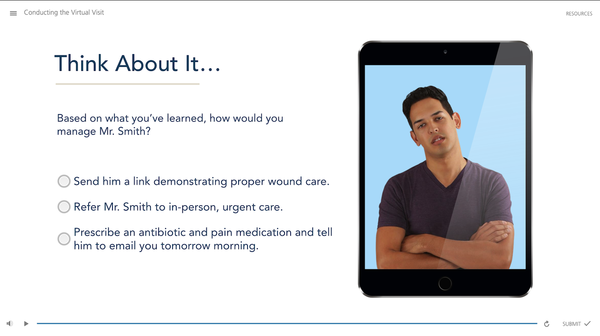We design and build interactive e-learning modules for use in both classes and for external projects. We are always happy to talk about project ideas. Whether you have an inkling of an idea or a fully fledged concept for interactive learning modules, we’d love to brainstorm and may be able to help make it a reality.
Telehealth Modules
GW Health Sciences and the School of Nursing collaborated with Wolters-Kluwer publishing on a series of self-paced online lessons about telehealth for all types of healthcare providers. This resource is licensed to other institutions by Wolters-Kluwer and is available to all at GW through the Himmelfarb Library.
The modules are also available within Blackboard for any GW program that would like to use them in a course. Modules include:
- Telehealth Primer
- Patient Care Via Telehealth
- Regulations, Reimbursement, and Ethical Issues in Telehealth
- Interprofessional Telehealth Teams
- Infrastructure and Organizational Readiness for the Provision of Telehealth
- Mobile Health Technologies
Contact Laurie Lyons at lbl [at] gwu [dot] edu (lbl[at]gwu[dot]edu) for details about these modules.

Virtual Labs
Designed and built two online interactive labs for complex topics in Molecular Diagnostics using custom graphics. The labs on nucleic acid extraction and agarose gel electrophoresis simulate hands-on lab experiments. Branching was used to allow students to experience the consequences of mistakes. The labs also emphasize key concepts and assess comprehension.
Students have been using the virtual labs every semester since early 2017. Efficacy was measured using pre- and post- tests with experimental and control groups in the same class. Students who completed the virtual labs performed significantly better (p=0.00026) on the post-test compared to the control group. Surveys indicated that students highly value the virtual labs.
Collaborators: Marcia Firmani from the Biomedical Laboratory Sciences Program.

Acute Care Physical Therapy Cases
Designed five decision-based interactive acute care cases to help better prepare physical therapy students for clinical internships. Cases evolve over several postoperative days. Students must integrate patient records, with what they see and hear to make treatment decisions. Immediate feedback is given at each decision point.
Every PT cohort since 2013 has benefited from these experiences, helping prepare them for clinical internships. Read the resulting publication.
Collaborators: Ellen Costello, Elise Ruckert, and Marisa Birkmeier from the Physical Therapy Program
Self-Paced Training for the Functional Assessment Standardized Items (FASI)
To quickly train assessors from five states across the country, we developed a self-paced interactive training for administering the FASI tool with people with various types of disabilities. After being oriented to the tool, the training is competency-based, giving learners many opportunities to practice coding people’s function using the FASI tool and getting immediate qualitative feedback on their choices. To enable this practice, we recorded and edited video from real assessments of regular individuals in their homes. This training was challenging. There were no true-false questions about a slide deck!
In a survey completed after assessors were several weeks into conducting assessments, 97% of the learners strongly agreed or agreed that the online training was helpful and 76% strongly agreed or agreed that the training prepared them well to conduct assessments using the FASI. While we would have liked to see that number higher, know that this online training was their only training to conduct lengthy assessments with a variety of people in sometimes challenging situations.
Collaborators: Trudy Mallinson, Ken Harwood, and Joyce Maring from GW Health Sciences along with the IMPACT team, under a subcontract with IBM Health Analytics